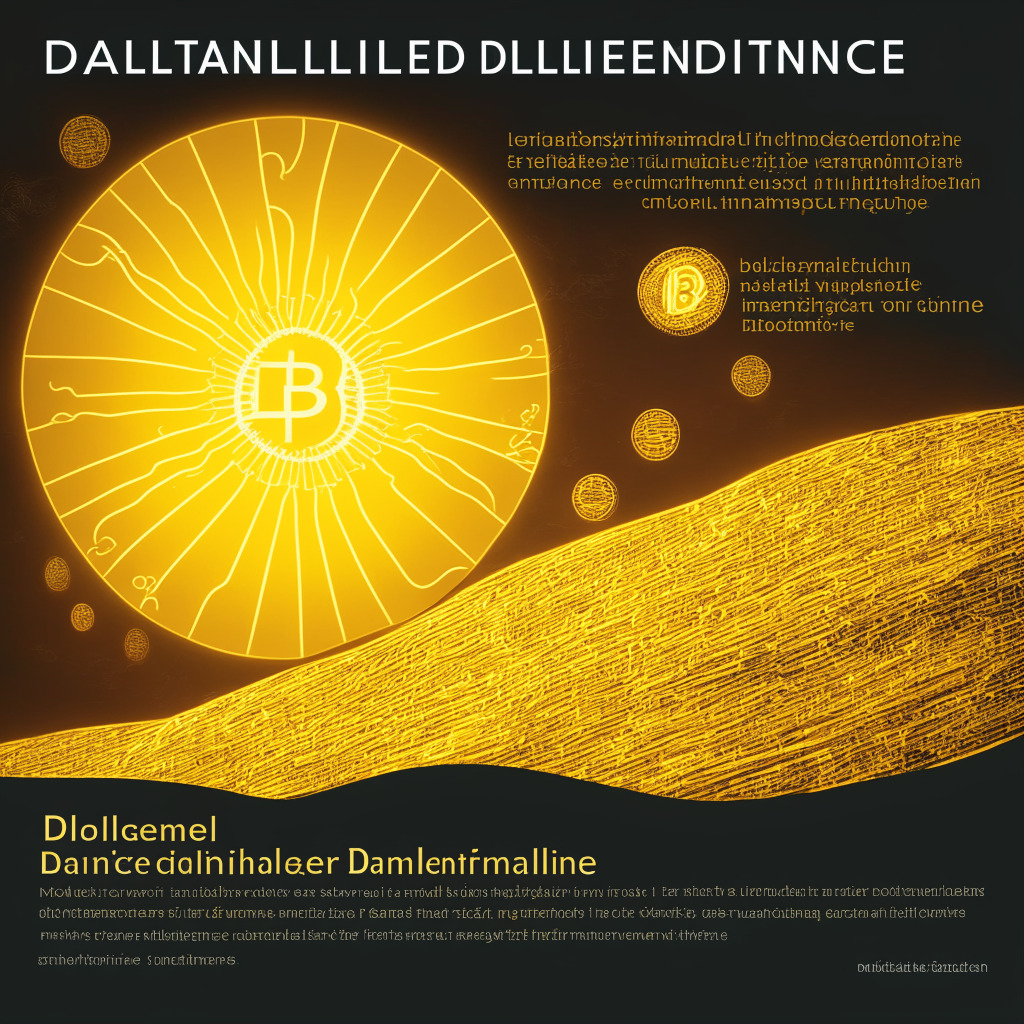French authorities have raided Nvidia offices as part of a larger investigation into the cloud computing sector and potential anticompetitive practices. The implications of this action underscore an ongoing tug-of-war between innovation and market monopolization in the tech industry.
Search Results for: Financial Services Agency
Navigating the Crypto Frontier: The Influx of New Services, Market Moves and Regulatory Challenges
“Asian crypto exchange HashKey Exchange ventures into retail crypto trading services for Hong Kong’s investors, with initial trades open for Bitcoin and Ether. However, traders can invest a maximum of 30% of their net worth into cryptocurrencies, aiming to protect investors from potential losses in volatile crypto market.”
US CBDC Dilemma: Balancing Privacy, Security, and Financial Inclusion in a Digital Era
The Treasury Department leads an interagency working group studying a potential U.S. central bank digital currency (CBDC). As digital currencies gain traction, finding a balance between innovation, trust, protection, privacy, and financial inclusion is crucial for the nation’s digital financial future.
Risky Payment Apps vs Secure Bitcoin: Navigating FDIC Protection & Financial Security
The Consumer Financial Protection Bureau (CFPB) warns that funds stored in popular payment apps may not be insured, highlighting possible financial uncertainties. Bitcoin, with its decentralized nature and self-sovereignty, gains attention as a secure alternative providing users sole ownership and control over their funds, unlike payment apps.
Japan’s Bold New Path: Cryptocurrency Funding for Startups and Its Implications
The Japanese government is allowing start-ups to raise public funds through cryptocurrency assets rather than traditional stocks. The Financial Services Agency is amending the tax code, promoting the adoption of cryptocurrencies and demonstrating Japan’s commitment to blockchain technology. However, the inherent volatility and potential misuse of cryptocurrency remain concerns. The new initiative is a bold move that will bring both opportunities and challenges into the nascent tech market.
Japan’s FSA Suggests Crypto Tax Reforms: An Effort to Revitalize the Digital Asset Landscape
Japan’s top financial regulator, the Financial Services Agency (FSA), has proposed changes to the country’s tax laws regarding digital asset profits. This move aims to better align Japan’s stance on cryptocurrencies with global standards, reduce financial burdens on local businesses, and foster innovation within the blockchain industry.
Rethinking Crypto Taxation: Japan’s Blockchain Future Amidst Regulatory Complexities
Japan’s Financial Services Agency is looking to change its tax code related to digital assets, potentially eliminating annual tax on unrealized cryptocurrency gains. Advocates argue this could stimulate business and aid blockchain startups, but critics cite possible manipulation and volatility.
Japan’s Crypto Tax Reform: Boosting Blockchain Growth or Reducing Government Revenue?
Japan’s Financial Services Agency is overhauling cryptocurrency regulations, focusing on tax systems for companies holding crypto assets. The proposals aim to amend the rule of taxing unrealized gains, a model criticized for hindering innovation in the blockchain and digital asset sector.
Netmarble’s MBX Token Triumph at Japan’s Zaif: A Blessing, Curse, or Both?
South Korean video game giant, Netmarble, has made a significant move into blockchain gaming with its subsidiary’s coin, MarbleX’s MBX, which has become the first token from a South Korean gaming firm to get listed on the Japanese crypto exchange, Zaif. Despite numerous challenges posed by strict local regulations and policies, this progress represents a remarkable victory in the blockchain gaming industry. However, potential future hurdles, including increasing regulations in South Korea and a ban on initial coin offerings, cannot be overlooked.
Unleashing Blockchain’s Potential: TradeFinex, SBI and the Balance of Transparency vs Regulation
“SBI Holdings is collaborating with United Arab Emirates’ TradeFinex to foster adoption of enterprise blockchain in Japan. This venture offers blockchain-based financial services and provokes a debate over whether such technology enhances financial transparency or circumvents regulatory oversight.”
EOS Network’s Dramatic Turnaround: Nod from JVCEA & Promises of the Japanese Market
EOS Network, a blockchain that garnered $4 billion in its initial coin offering, has been granted white-list approval by Japan’s regulatory body for crypto exchanges. This allows EOS to compete with major cryptocurrencies like Bitcoin and Ethereum on Japan’s regulated crypto exchanges. The approval signifies EOS’s compliance commitment and opens new opportunities for the network in the Japanese market.
Binance Marches Back Into Japan: Strategic Move or Risky Gamble for the Crypto Giant?
“Binance, a leading global cryptocurrency exchange, recently launched its Japan-based branch amid earlier regulatory issues. Their presence in Japan, acquired through Sakura Exchange Bitcoin, aims to boost the Japanese digital-asset markets and aligns with the Prime Minister’s plans for promoting Web3 innovations.”
Binance’s Return to Japan Sets August Debut Amid Shrinking Competition: A Bold Move or a Folly?
“Binance, a leading crypto exchange, plans to reintroduce its services in Japan after a two-year hiatus due to regulatory issues. Its reentry is facilitated by the acquisition of regulated crypto exchange, Sakura Exchange BitCoin. Meanwhile, rivals Coinbase and Kraken exit the Japanese market, citing ‘market conditions’.”
Navigating the Waves: Circle’s Visionary Take on Japan’s Stablecoin Market Revolution
Circle is targeting the Japanese market following that country’s new stablecoin regulations. According to CEO Jeremy Allaire, Japan has created a legal structure conducive to overseas stablecoins, which might transform it into a significant market for Circle’s USDC stablecoin. The regulations stipulate that stablecoins must be fully backed by yen or another legal tender.
Stablecoin Rise in Japan: A Regulatory Leap or a Controlled Crawl?
“Japan’s new regulations governing stablecoins could make it a hub for the burgeoning stablecoin market. However, strict rules apply: only licensed financial institutions can issue stablecoins, must be pegged to legal tender, and guarantee at-face-value redemption.”
Japan’s Crypto Leverage Debate: Balancing Industry Growth and Investor Protection
Japan’s crypto exchanges seek to increase the permitted leverage for retail investors due to a significant drop in annual margin trading volume. They aim to propose leverages ranging from four to ten times. Updated leverage rules could promote industry growth and maintain investor protection, but exchanges must justify the increase while aligning with government objectives.
Japan Considers Easing Crypto Margin Trading: Boon for Blockchain Industry or Market Instability Risk?
Japanese regulators are considering easing restrictions on margin trading to attract more crypto and blockchain companies, with industry players hoping for leverage limits of four to ten times for retail investors. This move may encourage more market trading but raises concerns about market stability and investor protection.
G-7 and G-20 Nations Divided over Stablecoin Regulations: Impact on Global Crypto Adoption
Global leaders are creating universal rules for the crypto sector; however, G-7 advanced economies favor allowing and regulating stablecoins, while emerging G-20 economies voice concerns for stricter restrictions. This disagreement could hinder global acceptance of stablecoin norms and fragment unified oversight.
Navigating the Complex Crypto Landscape: Regulations vs. Adoption and Innovation
The reported events highlight the complicated relationship between cryptocurrencies and authorities, with regulators becoming stricter in a growing industry. Despite the uncertain landscape, positive steps towards adoption are seen in governments and the private sector, exemplifying progress and innovation.
Binance’s Japanese Platform Launch: Compliance, Limitations, and Adoption Impact
Binance plans to transition Japanese users to a specialized local platform compliant with national regulations this summer. This move highlights the ongoing challenges and opportunities within the rapidly-evolving regulatory landscape for cryptocurrencies, ultimately paving the way for increased adoption and trust in the global market.
Binance Japan GM on Stablecoins Bridging Economic Gap: Opportunities and Challenges
Binance Japan’s general manager, Tsuyoshi Chino, highlights the role of stablecoins in bridging the gap between the real-world and blockchain economies due to their stable value. However, market challenges and gaining regulatory trust remain important factors in promoting broader crypto acceptance.
Japan’s Stricter AML Measures: Balancing Crypto Regulation, Privacy, and Innovation
Japan implements stricter anti-money laundering measures, including the “travel rule” from FATF, to align with global standards. This aims to create a safer crypto environment but faces skepticism over potential privacy infringement and hindering industry innovation. Finding a regulatory balance is crucial for maintaining a thriving crypto market.
North Korean Crypto Heists: Protecting Japan’s Booming Blockchain Economy
North Korean hackers have allegedly stolen $721 million in cryptocurrency from Japan since 2017, contributing to 30% of global crypto thefts. Japan’s favorable regulatory environment and increased cryptocurrency adoption create an attractive target, requiring a balance between innovation and stringent security measures to protect investors.
MoonPay’s Cryptocurrency Swapping: A Simplified Approach with Potential Risks and Future Promise
“MoonPay has launched a feature for users to swap one cryptocurrency for another, elevating their consumer-focused application. Despite facing allegations of artificially inflating NFTs, major firms are expanding their crypto portfolios mirroring MoonPay’s approach. Adapting regulatory framework, business strategy, and observing ethical issues are key to this emerging tech’s growth.”
Balancing Act: Supervising AI Vs. Regulating Cryptocurrencies – Who Gets the Upper Hand?
This article discusses a project launched by UNESCO and the Dutch government to study AI supervision across Europe, aiming to develop guidelines from best practices. It also highlights the contrast of some nations focusing heavily on AI regulations, while cryptocurrency protocols, such as for stablecoin transactions, are being neglected. The importance is stressed of striking a balance between embracing technological advances and ensuring proper regulation for consumer protection.
Political Pressure Meets Blockchain: The Shifting Sands of UK’s Crypto Regulatory Landscape
“Former FCA chairman Charles Randell discusses alleged political influence on UK regulatory bodies to adopt cryptocurrency companies. While some see these pressures as compromising, they may catalyze the safe adoption of emerging technologies like cryptocurrency within custom-built frameworks for the digital asset sector.”
Busan’s Bold Pursuit to be a ‘Blockchain City’: A Step Forward or a Step Too Far?
South Korea’s second-largest city, Busan, seeks to become a ‘Blockchain City,’ building an Ethereum-compatible mainnet for its various blockchain services. The city has allotted a budget of 100 billion won ($75 million) under the Blockchain Innovation Fund (BIF) with hopes to stimulate a seamless transition into blockchain implementation, by enhancing private services’ quality and interconnection.
Turbulence in Crypto Regulation: NYSDFS Deputy Superintendent’s Departure and its Impact
Peter Marton’s departure from his position as deputy superintendent of virtual currency at the New York State Department of Financial Services signifies a significant shift in the regulatory governing virtual currencies. His move to the private sector, after overseeing rigorous policies surrounding the crypto market including BitLicenses, leaves an influential gap in this sector, posing the question – who will fill this role?
Regulatory Gauntlet: Crypto’s Confrontation with Dated Securities Laws
“Crypto’s audacious defiance of conventional regulatory frameworks is drawing widespread regulatory attention. Enforcement activities now target leading crypto entities, leveraging laws up to 90 years old. As scrutiny increases, the key question is what will crumble first – our dated securities laws or the crypto industry itself?”
SEC’s Crypto Regulation Approach: A Stepping Stone or Stumbling Block?
Gary Gensler, the SEC Chairman, is facing criticism from lawmakers for his aggressive stance on crypto regulation lacking transparency. The SEC’s focus on enforcement and penalties, absent clear guidelines on crypto assets within its jurisdiction, has come under scrutiny. Furthermore, differing views on regulatory approach, particularly regarding potential links between Prometheum and Chinese entities, have led to questioning of the SEC’s approval procedures. As Gensler prepares to return to Capitol Hill, debates on cryptocurrency policy will intensify, with calls for a cohesive, clear, routine for regulating this sector.
Grayscale’s Victory Stirs Up Controversy: Doubts Over SEC’s Gensler Heighten
“Cryptocurrency circles discuss Grayscale’s lawsuit and SEC chair Gary Gensler’s role. Congressman Warren Davidson suggests Gensler’s SEC decisions lack stead, as demonstrated by Grayscale’s legal victory. This opens up possibilities for a Bitcoin spot ETF emergence in the US, but the situation remains uncertain.”
Binance Shakes Up Latin American Crypto Market: Suspends Debit Cards but Launches ‘Send Cash’
Binance’s new product in Latin America, “Send Cash”, combines crypto payment tech with licensed services for enhanced efficiency and lower transaction costs. Less than 1% of users will be impacted by the suspension of Binance’s debit card services. ‘Send Cash’ is a compensatory move targeting all Latin American nations with favorable rates, marking a strategic move towards feasible financial solutions to the region.































